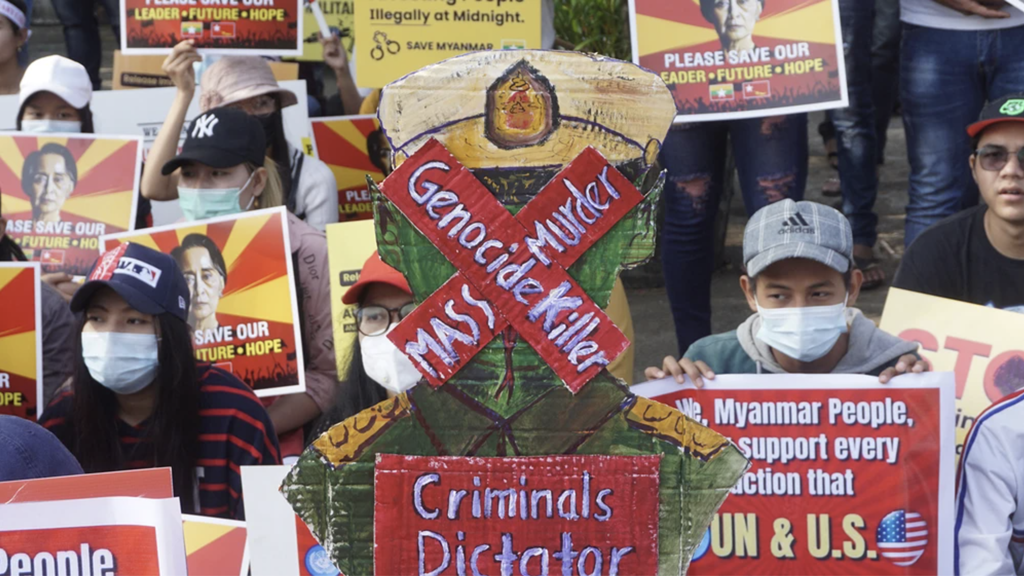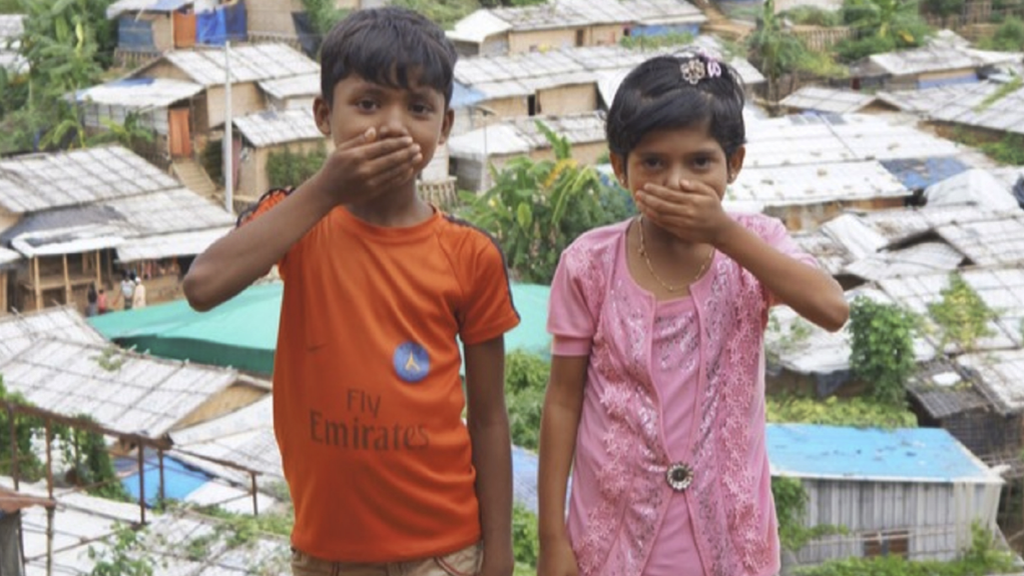
Myanmar Coup Protesters Regret Silence Over Rohingya Genocide
- 25/02/2021
- 0
By Verena Hölzl, VICE
Feverishly scrolling Facebook in the tense days after the Myanmar coup, app developer Aung Kyaw Paing saw a post that he could not stop thinking about. His friend said the Feb. 1 power grab was karma for the widespread denial of atrocities against the country’s minorities, especially the Rohingya Muslims—a campaign the United Nations has called genocide.
“I realized I had been racist,” he told VICE World News. “We were talking bad about the UN, blaming them for wanting to destabilize our government with their criticism of the Rohingya issue. Now we are looking up to them for help.”
He decided he needed to make a radical break from the past at a key moment in Myanmar history.
“If I die tomorrow in the protests, I don’t want to have this regret on my mind,” the 23-year-old said, referring to the nationwide civil disobedience campaign against the coup.
The military’s violent expulsion of more than 740,000 Rohingya Muslims in 2017 brought condemnation around the world and ruined the reputation of former rights icon Aung San Suu Kyi, who sided with the very military that now has her under detention on multiple charges.
“If I die tomorrow in the protests, I don’t want to have this regret on my mind.”
But fueled by online propaganda and decades of brainwashing depicting Rohingya as outsiders, it was the refusal by members of the public to believe allegations of rape, arson and murder that stunned supporters of Myanmar’s fledgling democratic transition.
The military successfully painted the “clearance operations” in Rakhine State as a mere counterinsurgency against Rohingya militants. At the time, it was common to accuse Rohingya refugees who fled to Bangladesh of being “drama queens” and “liars” who made up the horrific tales for money and international support. Some even took to the streets in support of the armed forces that convinced people they were protecting them from “Muslim terrorists” attacking Buddhist-majority Myanmar.
After the coup, however, a shift in thinking has started to take place, with apologies on social media and in protest signs on the streets. That is being matched by Rohingya refugees showing support for demonstrations despite not receiving it in their time of need. Some even joined the rallies in Yangon, risking arrest or persecution in a society that denies them basic citizenship rights. They now have a mutual foe, Myanmar coup mastermind Min Aung Hlaing, who is accused of overseeing the campaign against the minority.
While difficult to judge how broad this reckoning will be, it is deeply meaningful in a country where only a few years ago uttering the word “Rohingya” could trigger an angry outburst from strangers.
Aung Kyaw Paing is one of several people speaking up with remorseful posts. Starting with a Twitter thread, he apologized for having been involved in the development of a voter app last year that was called out by activists for labeling a Rohingya candidate “Bengali”—a derogatory term for the Muslim minority that denies them their identity and, by extension, their historical citizenship rights.
“I am starting to understand the fact that my silence during that time made me complicit in the genocide of Rohingya,” he said in one tweet.
I know it's too late to say these words, but I have to admit something that has been haunting me. Back in October, I developed @mvoterapp with a couple of my friends, and the app got called out by @JusticeMyanmar for being racist towards Rohingya. (1)
— Aung Kyaw Paing (@vincentpaing) February 21, 2021
He is not the only one. Another Twitter user who identified himself as Myo addressed past comments about former UN human rights envoy to Myanmar Yanghee Lee, who was the subject of hate speech in the country for her outspoken criticism of Rohingya persecution,
“I do want to apologize [for] the way I treated you in recent years regarding Rohingya,” he tweeted, directing his comments at Lee.
Daw Aung San Suu Kyi, President Win Myint, Cabinet members,and others must be released immediately!People of Myanmar voted for NLD. Respect it!Tatmadaw showing cowardice w lame charges against them. International Community must show solidarity and act NOW!!!
— Yanghee Lee (@YangheeLeeSKKU) February 4, 2021
As a Rohingya, I'm also a Burmese. I can have many identities at the same time. If we let our differences divide us, we lose to the oppressive power. As we let this moment unite us, we get to work on the future that's peaceful & equal for everyone. #CivilDisobedienceMovement https://t.co/MLVKtMjJMP
— Yasmin Ullah (@YasminJUllah) February 15, 2021
Offline during the growing anti-coup protests, several signs have been spotted evoking similar changing attitudes, including a viral picture of a young man holding a sign at a busy intersection reading: “I really regret about Rohingya crisis.”
Myanmar's military coup is making some rethink attitudes they once held #WhatsHappeningInMyanmar pic.twitter.com/Va6tG2qZ5h
— Matthew Tostevin (@TostevinM) February 12, 2021
Armoured vehicles are seen patrolling in various areas in Yangon this evening. A private security company says they have confirmed reports of network shutdown from 1-9 am.
I am going to steal more chocolates from my child’s stash 2 stay sane tonight #WhatishappeninginMyamar pic.twitter.com/OOT5fF16Be
— Annie Zaman အန်နီဇမန်း (@Natrani) February 14, 2021
While by no means a mass movement, it’s an exceptional sight and an encouraging start, Rohingya activists say.
“Of course this is too little too late and we still need to see real action. But it makes me hopeful,” said Tun Khin, a Rohingya advocate based in London.
The personal reckonings build on those that started quietly before the coup, in the years after the crackdown against the Rohingya, when the dust settled and the online propaganda died down.
“Everybody was saying the same thing, so it was very easy to believe,” said student Ei Mon Thinn Kyu. “I am now very embarrassed about the hate speech that I posted about the Rohingya.”
Having moved to New Zealand two years ago for her studies, she realized what it meant to be a minority. She started reading books about the Rohingya persecution in Myanmar, which stripped them of their rights over decades, leaving them with little access to healthcare, education or freedom of movement.
“I am now very embarrassed about the hate speech that I posted about the Rohingya.”
Like most people there, when she was still living in Myanmar, she never met a Rohingya person. The ethnic minority lives largely segregated, some locked up in camps and ghettos in heavily militarized Rakhine State. Rohingya who get away and move elsewhere in the country keep a low profile to avoid discrimination or being arrested and sent back. “Those staying in Yangon don’t tell us they are Rohingya,” she added.
Since the coup, she has been moved by the posts and pictures of Rohingya refugees in Bangladesh showing solidarity with the protesters.
“We were not with the Rohingya when they needed us, but they are with us now that we need them,” she said on Twitter when Rohingya in the refugee camps posted photos of solidarity.
Thank you. We were not with Rohingya when they need us. But they are with us when we need us. After this revolution, we must stand for them.#AungSanSuuKyigovernment #Myanmar #WhatsHappeningInMaynmar https://t.co/SxtBC5gRH0
— Ei Kyu (@EiKyuOctober) February 6, 2021
For Rohingya in the country, the past few weeks of demonstrations and public shows of regret from Myanmar protesters have empowered them to come out of the shadows as well. For the first time in a long time, it has made them feel like citizens again.
“These protests are a chance for us to show our patriotism,” said Sayed Noor, a 28-year-old Rohingya man in Yangon. “We have a responsibility to reject this coup.”
At first he went out to the protests on his own, but then he gathered up the courage with a group to identify as Rohingya with their own signs. Ten of his friends agreed to join him. They were initially scared of hostilities, but got a lot of positive attention instead. “Some even distributed water and snacks to us,” said Sayed, remembering the extraordinary moment of acceptance with emotion. “It was awesome.”

Rohingya activists abroad have also experienced a wave of keen interest by activists from within Myanmar. Some are particularly interested in how to get the generals convicted in international courts, where cases are already pending against the military for the campaign against the Rohingya.
“I have to explain to them that it doesn’t work like this with a coup. I feel like a lawyer now,” said Rohingya activist Nay San Lwin, chuckling. Since the takeover, the number of his new social media followers from Myanmar has exploded.
Others in Myanmar have seized the opportunity to be more public about their empathy for Rohingya, which feels safer now that there is less public backlash against them.
“This is a politically important moment for everyone,” said peace activist Thet Swe Win.
Driven by guilt in the aftermath of the 2017 crackdown on the Rohingya, he secretly traveled with colleagues to the refugee camps in Bangladesh. For fear of repercussion, Thet Swe Win had held off publicly promoting a short documentary about the trip. But recently, he decided to tweet about it. “Now I don’t have to hide anymore. People are accepting it. The military is now our common target,” he said.
My solidarity trip to Rohingya Camps in Bangladesh two months after the Exodus. Was arrested there by Bangladesh Military and detained for few days. The full documentary film will be out soon. #myanmar#rohingya#empathy
— Thet Swe Win (@Thet_Swe_Win) February 17, 2021
The election app developer Aung Kyaw Paing still has trouble making sense of why he didn’t do more research at the time of the Rohingya crackdown. Like many, he thought the country was on a new path since transitioning from direct military rule a decade ago. But now he’s not so sure.
“I was naive. So many things in our country had changed in the past years, and I thought the military had changed, too,” he said. “It’s really scary that we all believed what they said.”






